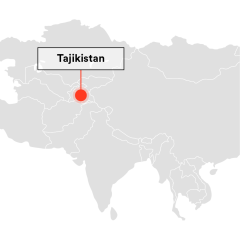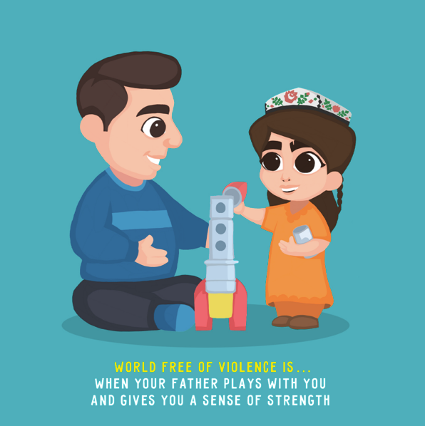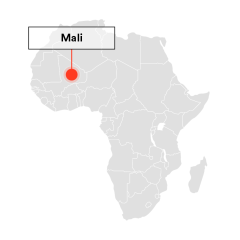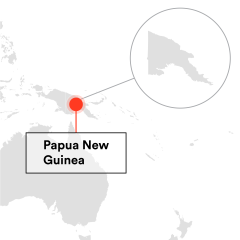Build healthy relationships to prevent VAWG

Build healthy relationships to prevent VAWG
Case Studies

This programme worked with Muslim religious leaders – and in partnership with Tajikistan’s State Agency Committee on Religious Affairs and the Regulation of Traditions, Celebrations, and Ceremonies (CRA) - with a view to shifting attitudes, practices and norms to improve gender equality, promote healthy relationships in families, promote sexual and reproductive health and rights and prevent gender-based violence, including domestic violence and early marriage. It trained 270 Imams using the ‘Healthy Lifestyle’ handbook and encouraged them to address these issues in sermons and through their conflict resolution and mediation work with families and heterosexual couples. The programme engaged directly with verses in the Quran around gender equality and was designed to be culturally relevant in the context.

Results
- Religious leaders and the CRA collaborated more closely with the Tajik Family Planning Association and Committee on Women and Family Affairs (CoWFA) when dealing with SRHR issues and domestic violence.
- In the targeted communities, several ‘Friday prayer’ sessions have focused on preventing GBV and promoting SRHR.
- The programme developed a pre-marriage handbook for couples intending to get married.
- There are testimonies of religious leaders dealing more equitably with marital conflict, listening to both the woman and the man, and supporting them to identify and address the root causes of the conflict and avoid the use of violence.
- The programme recognised that in-laws can also be involved in family conflict and violence and has also included work with wider family members.
- The trained leaders started to advocate for other religious leaders to also work to end violence against women and girls.
- At the end of the Spotlight Initiative programme, the Tajik Family Planning Association secured funding from another donor to continue the work and engage more religious leaders.



In Mali, Spotlight Initiative supported the establishment of 829 model husband clubs for currently married men aged 20-40 (Club des Maris – CDM) and men planning to marry aged 14-24 (Clubs des Futurs Maris – CDFM). A Model Husbands club is a voluntary space that brings men together to collectively reflect and take action to become a model husband. The clubs are participatory and open spaces for discussion, sharing and decision-making built on the values of active listening, equality and respect. The six thematic sessions are built on a gender transformative approach, are led by men in the group and involve reflecting on their own behaviour, gender norms and inequalities, and positive masculinities. They also include sessions to discuss what it means to work as allies of women and girls to support them in pregnancy, reduce maternal morbidity and mortality and prevent all forms of GBV including child marriage and domestic violence. They support men to become advocates and to raise the awareness of others to take positive action and promote women’s and children’s rights.
Results
The Model Husbands have been powerful forces for change in communities where they are operating, raising awareness of women’s and children’s rights and even preventing domestic violence and child marriage in some communities. A man from one Model Husband Club shared: "I confess that the actions of this project have already paid off because, in our village, every night, there is at least one woman who cried under her husband's baton. It's been more than three months since we heard this."
Nonetheless, a key learning has been the amount of time it takes to address attitudes and social norms that underpin traditional practices and the importance of involving religious leaders in this work.



Data shows that children in Papua New Guinea commonly experience physical and/or verbal abuse and/or neglect from their parents/caregivers. The levels of abuse are higher for disabled and adopted children. In addition, many children witness violence between their parents and among other family members. The Spotlight Initiative (led by UNICEF), in partnership with faith-based organisations (FBOs) and civil society organisations (CSOs), launched the Parenting for Childhood Development (P4CD) programme in six provinces of Papua New Guinea. This programme consisted of a series of training workshops for parents and caregivers of children aged 3-10 years in the selected communities based on a curriculum adapted for the context. The programme was initially piloted by another organisation in ten communities in 2016, then a further four provinces in 2016-2017. In 2018-2019, under Spotlight Initiative, it was then expanded to further provinces and communities.
Six modules were delivered over 6-12 weeks and covered the following topics: educating parents on children’s development and behaviour; providing them with practical knowledge on how to better take care of children; and building skills to discipline without corporal or physical punishment and emotional abuse. Participating parents received a certificate after completing the training. These workshops were delivered by trained community parenting facilitators – women and men from the communities including parents and schoolteachers. A key learning was the importance of applying a collaborative, non-judgemental approach with parents. By the end of 2023, a total of 23,315 people were reached by the programme (6000+ parents and their children). The building blocks for sustainability have been put in place with PNG’s National Office of Child and Family Services (NOCFS) now in charge of the P4CD programme, and a local training institute is implementing a Training of Trainers programme for facilitators.
Results
The initial programme was evaluated from 2018-2021 using a theory-driven evaluation approach with baseline (2017) and endline (2021) surveys, key informant interviews and focus groups, as well as the use of monitoring data and secondary data sources. The evaluation showed the following changes after the intervention:
- 77% of parents targeted by the programme said that they had not hit their children in the past 3 months, compared to only 8% before the intervention.
- 81% of fathers targeted by the programme said they spent time together with and playing with their children, compared to 40% before the intervention.
- 56% of fathers targeted by the programme said that they had not hit their wives in the past 3 months, compared to only 18% before the intervention.
- Qualitative data confirmed examples of positive changes in relationship quality between parents and children including better communication and listening, use of positive discipline and more men taking care of their children. There were also impacts on couples’ communication skills with better problem-solving and increased mutual respect.
You can read the stories of 5 parents here. The evaluation also made recommendations for improving the programme, including more consistent implementation across communities, deeper facilitator training to further support parental communication skills, a stronger focus on parenting children with disabilities, and integrating more gender transformative elements and child rights material into the curriculum.
Sources: Spotlight Initiative Compendium of Innovative and Good Practices and Lessons Learned, UNICEF (2021) Evaluation of the UNICEF Parenting For Child Development Programme; Papua New Guinea Spotlight Initiative Annual Report 2020; Papua New Guinea Spotlight Initiative Draft Annual Report 2023.







